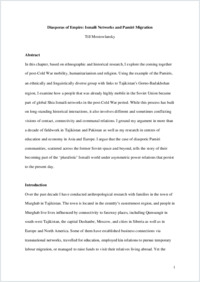Diasporas of Empire: Ismaili Networks and Pamiri Migration
BP2-STS
- Mostowlansky, Till University of Fribourg
- 2023
Published in:
- The Central Asian World. - London and New York: Routledge. - 2023, p. 591-603
English
In this chapter, based on ethnographic and historical research, I explore the coming together of post-Cold War mobility, humanitarism and religion. Using the example of the Pamiris, an ethnically and linguistically diverse group with links to Tajikistan's Gorno-Badakhshan region, I examine how a people that was already highly mobile in the Soviet Union became part of global Shia Ismaili networks in the post-Cold War period. While this process has built on long-standing historical interactions, it also involves different and sometimes conflicting visions of contact, connectivity and communal relations. I ground my argument in more than a decade of fieldwork in Tajikistan and Pakistan as well as my research in centres of education and economy in Asia and Europe. I argue that the case of diasporic Pamiri communities, scattered across the former Soviet Space and beyond, tells the story of their becoming part of the "pluralistic" Ismaili world under asymmetric power relations that persist to the present day.
- Faculty
- Faculté des lettres et des sciences humaines
- Department
- Département des sciences sociales
- Language
-
- English
- Classification
- Anthropology, ethnography
- License
-
License undefined
- Open access status
- green
- Persistent URL
- https://folia.unifr.ch/unifr/documents/328588
Statistics
Document views: 49
File downloads:
- mostowlansky_v5_march2023_final_withepilogue_ref: 109
